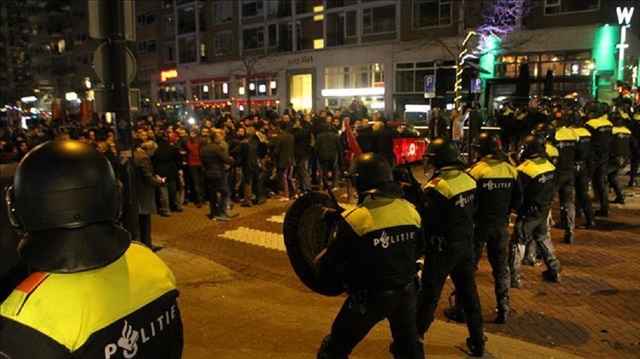

Growing number of nations denounce Dutch government for blocking Turkish ministers from meeting ex-pats
Growing number of nations denounce Dutch government for blocking Turkish ministers from meeting ex-pats
Egypt, Iraq, Mauritania and Tunisia on Monday joined an international chorus of condemnation after the Netherlands barred Turkish ministers from meeting Turks in Rotterdam.
Adnan Mansar, Secretary-General of the Tunisian Harak Tounes al-Irada political party, said the Dutch's denial of a flight permit for Turkish Foreign Minister Mevlut Çavuşoglu as “provocative" and “aggressive".
Prominent Egyptian opposition leader Ayman Nour described the Dutch action as “unacceptable".
Iraq's former Vice President Tariq al-Hashimi wrote on Twitter that the Turkish government's move to explain proposed constitutional changes were democratic as he went on to accuse European nations of acting in a “totalitarian" manner.
A representative of a Mauritian umbrella group the National Forum for Democracy and Unity, Veled Eddi said that it was a “weird blockage".
The Dutch government canceled Çavuşoglu flight permit to the Netherlands and then blocked a convoy carrying Family Minister Fatma Betul Sayan Kaya from entering the Turkish consulate in Rotterdam
The ministers were due to meet Turkish society ahead of a referendum April 16 that will decide constitutional reforms.
The Dutch government said it canceled Cavusoglu's flight permit because of "security" and "public safety" concerns.
Protests erupted outside the consulate in Rotterdam, where police used guard dogs and batons to disperse a peaceful crowd that had gathered in support of Kaya. She was later forced to leave the consulate area with a police escort.
Council of Europe Secretary-General Thorbjorn Jagland said Sunday tensions between Turkey and several European countries was damaging to diplomacy and democracy.
"We cannot allow it to escalate any further," Jagland said, adding that all Turkish citizens should have ample opportunity to be informed about the referendum campaign.
"All public meetings and political campaigns held in Council of Europe member states should be conducted in accordance with national legislation and the European Convention on Human Rights," he said.
French Foreign Minister Jean-Marc Ayrault urged Dutch and Turkish authorities to reach an agreement. "Faced with the current tension between Turkey and several member states of the European Union, France calls for appeasement," he said in a statement Sunday that also “calls on the Turkish authorities to avoid excesses and provocations,
In these circumstances, it is essential to be accountable and to avoid unnecessary polemics," it added.
Azerbaijan foreign ministry spokesman Hikmet Haciyev said the Dutch treatment of Turkish ministers was biased.
"What has been done against the Turkish government's officials, the hinderance of meeting and demonstration freedom of Turks in the Netherlands and the use of power against them is contradictory and prejudiced," Haciyev said.
The stand-off between Turkey and the Netherlands should be sorted out “as fast as possible", according to British Foreign Secretary Boris Johnson.
"I think this is very regrettable," Johnson said while speaking at a weekend political program on the ITV channel.
French Foreign minister Jean Marc Ayrault said the meeting of Turkish foreign minister in Metz "is a matter of freedom of assembly".
Yousuf Al-Koda, head of the Islamic Wasat Party in Sudan, said the move against Turkish ministers contradicted human rights and concepts of democracy "advocated by Europe".
Algerian lawmaker Muhammed al-Hadi Osmaniye said such racist and provocative attitudes served far-right groups in Europe. "The West does not want the spread of democracy in Muslim societies," he said.
#Family Minister Fatma Betul Sayan Kaya
#Netherlands
#Turkish Foreign Minister

